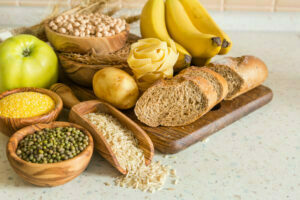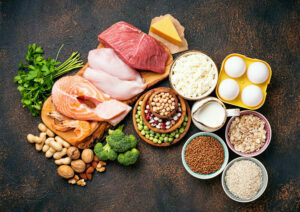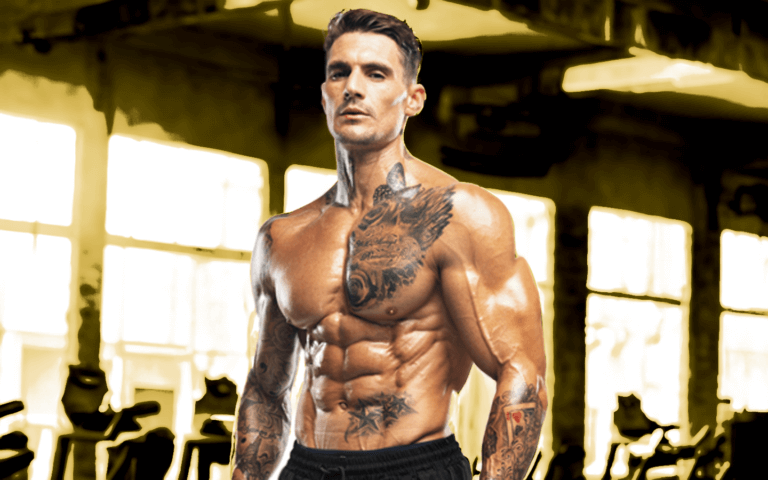Author: Mike Naylor
Nutritionist and co-founder of DUELFUEL Mike Naylor provides an essential guide to how and when to fuel your workout for optimal performance.
PRE-TRAINING

Meals and snacks consumed prior to intense training to fuel your workout should prepare you for activity, leaving you neither hungry nor uncomfortably full. For optimal performance, you should consume a meal sufficient in fluid to maintain hydration, low in fiber to minimize gastrointestinal distress, high in carbs to maximize glycogen stores, and containing moderate protein.
The size and timing of meals prior to training are interrelated. Smaller meals can be consumed nearer to the time of training (1-2 hours before), whilst larger meals can be consumed if adequate time is allowed prior to training.
Studies have suggested that consuming 100g to 300g of carbs around three hours before exercise can improve performance. During the hour before training, a small snack may be of benefit to replenish energy stores and reduce hunger.
DURING TRAINING

For most training sessions, there is little need to consume food during training to fuel your workout if your nutrition has been sufficient leading into the session. It’s often as simple as just as drinking water to support hydration. Anywhere between 250 ml to 1 liter per hour should suffice, depending on the environment and an individual’s sweat rates.
During intense training sessions there’s sometimes a need to top up energy availability by consuming a carbohydrate solution like an isotonic sports drink or carbohydrate gel. It may also be useful during particularly sweaty sessions, especially in hot and/or humid environments, to consume some sodium and potentially other minerals to replace what’s lost through sweat.
POST-TRAINING

Training hard can be demanding on your body. After an intense prolonged session your body can suffer from fuel depletion, muscle damage, and dehydration. Therefore, the goal of post-training nutrition is to refuel, repair, and rehydrate the body to ensure it recovers optimally to support your next workout. Focus on carbs to support refueling, protein for repair, and fluid to rehydrate.
Carbohydrates

Post training it is often beneficial to replenish carbohydrate stores in preparation for the next training session or match. The amount of carbohydrate consumed at this time should be specific to session undertaken. If it has been a light session where muscle glycogen stores would have not been significantly reduced, then there is no need to consume high amounts of carbohydrates at this time. If the session was intense and significantly reduced glycogen stores it is often beneficial to increase carbohydrate intake to replenish store.
Protein

Training can increase both muscle protein breakdown and muscle protein synthesis. If protein intake isn’t sufficient then net protein balance will remain negative, which has the potential to lead to reduced muscle mass and negative consequences for performance and recovery.
Following resistance-based training sessions, muscle protein synthesis has been shown to be elevated for up to 24 hours. There is still some evidence to suggest that it may be beneficial to consume protein directly after training to optimize recovery, especially if limited time is available until the next training session. To further maximize recovery and muscle mass development, consuming a meal consisting of 20-30g of protein every three hours is considered beneficial. Furthermore, including sufficient protein in your last meal of the day may also support optimal recovery.
The type of protein ingested is also important. Animal protein contains more of the amino acid leucine, which is thought to be the main trigger for an increase in muscle protein synthesis. Whey protein sources are abundant in leucine and offer quick absorption.
Fluid intake

Post-training, replenishing lost fluid is essential. A simple way to track how much you have lost during training is to analyze body weight pre- and post-training and replenish by drinking 1.5 x lost the weight lost. For example, if you lost 1kg during training, drink 1.5L of water/sports drink after. The most important aspect of rehydration is to ensure you are hydrated for your next exercise session. Use the pee chart as a simple way to determine if you are hydrated or not. Never start training in a dehydrated state.
If that hit home about the important role protein plays in recovery, read up on HOW TO INCREASE YOUR PROTEIN INTAKE






